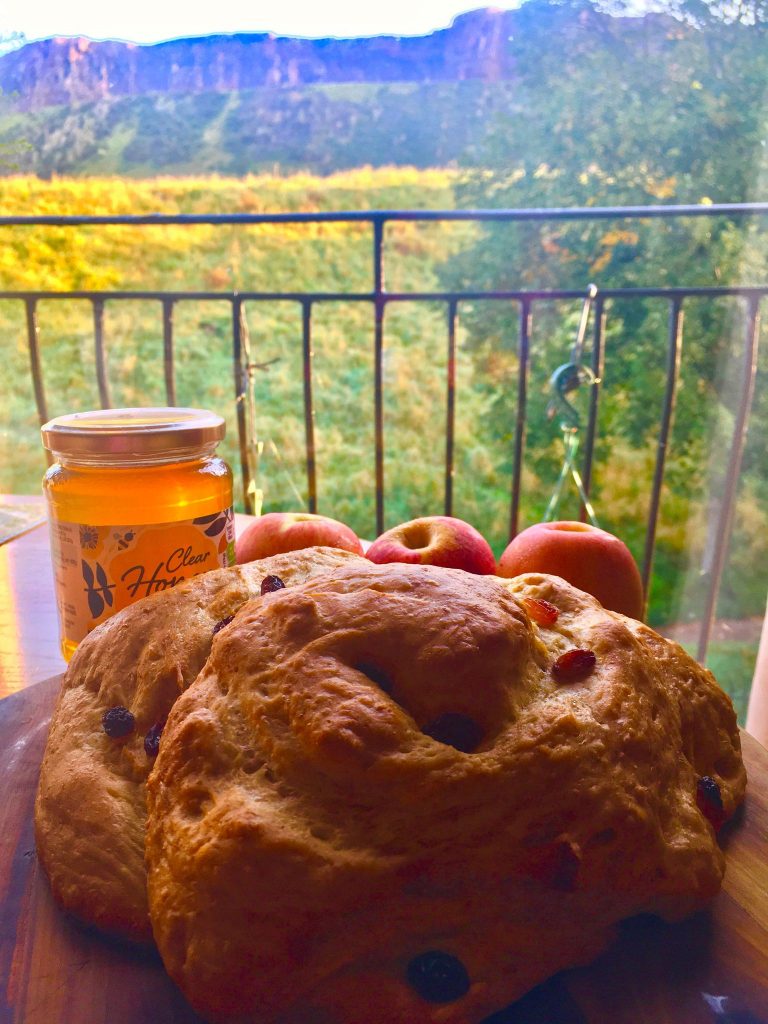This Year, A Special Jewish Hogmanay

by Professor Joe Goldblatt
The Jewish high holy days occur in the Autumn and begin with the celebration of the Jewish new year, Rosh Hashonah. According to tradition, the Jewish calendar began at the time of creation in 3761 BCE and therefore this year we celebrate the new year of 5781.
For many years, I annually accompanied my parents, of blessed memory and my sister Leah, to the synagogue in Dallas, Texas where together we solemnly prayed each Rosh Hashonah for a better year to come. This year my prayers shall be unlike any I have previously experienced. I suspect that many Jewish people shall feel the same way.
The Scottish people describe their new year with the traditional name Hogmanay. Like most Scottish history, there is wide disagreement as to the origin of this name and celebration. My friend, Dr Donna Heddle, an expert from the University of the Highlands and Islands, explained: “The name Hogmany could also come from the Anglo-Saxon ‘haleg monath’ meaning ‘holy month’.” Some say it could come from the Scandinavian ‘hoggo-nott’ meaning ‘yule’. Regardless of its origin, Scots traditionally celebrated Hogmanay even more widely than Christmas itself.
In Scots Gaelic we wish one another happy new year by saying “Bliadhana Mhath Ur” (pronounced Bleeana va oor). In Hebrew, the Jewish people wish one another happy new year by saying Shanah Tovah U’metukah (pronounced shawnah toe vah oo meh too kah) and this means have a happy and sweet year.
Therefore, as a Scottish Jew I have the great pleasure, rather than the conundrum, of celebrating two new years, several months apart. With each celebration we often greet (the Old Scots phrase meaning to cry) over the troubles in the past year and also rejoice with hope for a better year to come. This year, under very different circumstances than in past times, I shall be greeting and rejoicing more than ever before in my lifetime.
As a result of the global pandemic, this year, my synagogue attendance shall be virtual. I will join dozens of Jewish folks in Leicester and Edinburgh as our Rabbi conducts services for his dual congregations from his home in London. We will be “zooming” our prayers to the almighty this year.
Despite this new way of coming together for communal prayer, some things shall remain the same. Nancy has been baking her round challah to represent the totality of the year. This is a bread that is particularly made for the Jewish new year. She has also purchased honey and apples to signify good health (apples) our hope for a sweet (honey) new year.
During Rosh Hashonah we also symbolically prepare for the day of atonement (Yom Kippur) where we ask the almighty and our fellow human beings to forgive us for our sins in the past year. Symbolically, we imagine that we are literally standing in front of the closed gates of the new year and seeking admittance. We also imagine that there is a giant book of life upon which our future shall be written and we ask that we shall be recorded for a good and healthy year.
This year, as I pray on line with others, I shall be reflecting back to ask how the human race arrived at this precarious place where day by day we face so much daily uncertainty. I shall also ask what I may do to, as I offer up my prayers, to insure that future generations experience better days and also learn from our actions. Here are three questions I shall ask.
First, how may I and others now repair the world (this is the Jewish tradition known as tikkun olam) to provide great fairness, social justice, kindness and peace?
Secondly, what may we do communally to work together with others, including our friends and neighbours, to promote a healthier and more sustainable world for all?
Thirdly and finally, when future generations speak of this time, what will they say about our actions and what will they have learned from our accomplishments?
In the old Scots language there is a word that I often recite in regret or surprise. In the Jewish European language of Yiddish we also have a similar word that literally means the same thing. Because of the numerous regrets and surprises this past year I have daily said in Scots “Och!” and in Yiddish “Oy!” both under my breath and out loud numerous times. I hope and pray that I am able to reduce the number of times I say Och and Oy in the year to come.
I also believe with all my heart that this new year year may indeed provide a rare time of deep reflection where my thoughts and prayers may not only provide internal peace but also lead me to explore how I may work together with others to produce a much better world in the future.
My eleventh commandment of “Thou Shalt Work Together” might just provide the key to those golden gates and when they eventually open they shall perhaps draw me and others toward a better year to come for all. And once we step through those gates, may we all return to and be eternally recorded for many years to come with good health, peace and love.
Happy New Year!

L’Shana Tova, Joe! So glad we finally connected!
Me too! Shana Tova to you and your family.